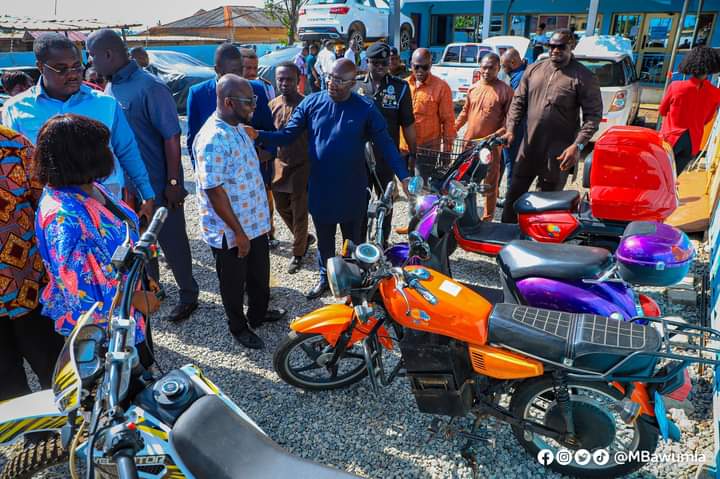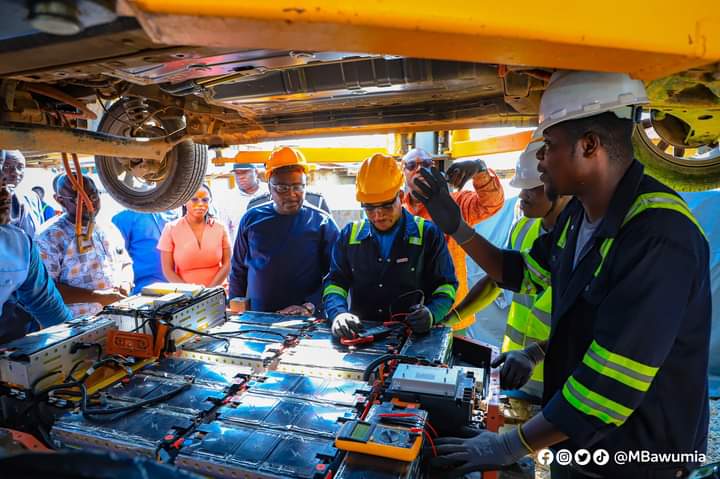By Godwill Arthur-Mensah
Accra, Sept. 29, GNA – The Government is working on a policy framework to ensure seamless utilisation of electric vehicles for public transportation in Ghana, Vice President Bawumia has said.
The E-mobility policy, he said, was in line with the government’s agenda of minimising emission of greenhouse gases and ensure cheaper transportation cost.
“Where I want to see us go in the next few years is to move public transport completely from a dependence on petrol and diesel to fully electric vehicles.
“That is really where Ghana ought to go. And it is doable. We ought to move away from petrol and diesel to electric vehicles as a matter of policy,” Dr Bawumia stated.
The Vice President said this when he paid a familiarisation visit to the premises of Ghanaian electric vehicle assembling company, Solar Taxi, at Laterbiokoshie, a suburb of Accra, on Wednesday.
The wholly-owned Ghanaian start-up firm began operations in 2018 and engaged in the assembly and manufacture of electric cars, motorcycles, buses and battery packs for electric cars.
It has so far supplied 500 electric vehicles to the Ghanaian market, 460 motorcycles and some tricycles in the northern regions of Ghana.
Solar Taxi is among the top three electric vehicle (EV) manufacturing companies in Africa, with a staff strength of 113, with 90 per cent of them females.
The firm can also convert petrol or diesel-powered vehicles into electric ones, with the technology to convert cars and buses also available.
Mr Jorge Appiah, the Chief Executive Officer and Co-Founder of Solar Taxi, said it had assembled more than 460 vehicles and sold over 500 vehicles, with orders for electric vehicles, battery packs and training on the maintenance of EVs coming from some African countries.

The company, he said, also operated a ride-hailing service, as well as motorcycle leasing and vehicle sales model.
Through its bankers, he said, the company provided financing options for its motorcycles, cars and buses, to be paid for overtime, without any collateral.
He said interested persons who required their services must submit their GhanaCard for processing of the necessary documents and firming up of the transactions.
Mr Appiah stated that while riding in one of the company’s EV buses, it could travel from Accra to Kumasi without the need for a recharge of the batteries.
The company’s electric bus carried onboard Vice President Bawumia and Chief Executives of STC, Metro Mass, Aayalolo, as well as some officials of the Environmental Protection Agency and the National Road Safety Commission.
Vice President Bawumia noted that the issue of climate change, energy transition and moving away from the dependence on fossil fuels to more green energy was very important to the nation.
“As you know, we spend a lot on fossil fuel. But the other thing that is very, very important for Ghanaian households and individuals is the high cost of transportation,” he observed.
“If you look at the cost of transport in Ghana, there are two elements that dominate the pricing formula for transport: fuel and spare parts. Now, with what you are doing with electric vehicles generally, I mean, the fuel costs really become very minimal.
“And then because of the nature of the engines for electric vehicles, it has very low maintenance. So, with these two elements, you will reduce the cost of transport very significantly,” Dr Bawumia noted.

The Vice President believed that one of the aspects of reducing the cost of living for Ghanaians was to move away from the dependence on fossil fuels to electric vehicles.
“Let’s make it happen. It’s possible,” he added.
Acknowledging that the transition from fossil fuel to electric vehicles may not be an easy path, Vice President Bawumia nevertheless argued that the benefit for Ghana in terms of lower prices for transport, savings on foreign exchange, job creation and opportunity to train more youth far outweighed the challenges.
“For example, you could really help the TVET institutions design a curriculum in terms of EV maintenance and so on, because as we move and see more adoption of EVs, you’ll need more people who can maintain them,” Dr Bawumia stated.
He pointed out that the cost of fuel and transport were the two main drivers of inflation in Ghana, noting that anytime those two elements increased, it had consequential implications on other variables like the exchange rate, cost of food and utilities.
The Vice President commended the founders of Solar Taxi for their commitment to innovation and entrepreneurship.
“We as a country, we really have to believe that it is possible to leapfrog many of the advanced countries in the area of technology. In the area of electric vehicle manufacturing, I think we have a bit of a comparative advantage in Africa and in Ghana compared to the more advanced countries.
“But what will really make it happen is people who have the ideas, who have the dedication like you, who have thought through this, who value chain in this whole enterprise.
“You have been able to put something together. From our point of view as a country, we are very interested in your success. Very, very, very interested. And we are even more delighted that it is the youth who have taken up the mantle of entrepreneurship. We as government will collaborate with you and provide the support you and others like you needed to deal with any bottlenecks,” Vice President Bawumia assured.
GNA